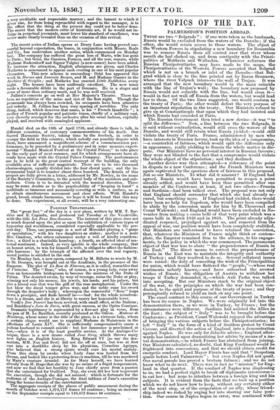PARISIAN THEATRICALS.
The "great fact" of the day is a new piece, written by MM. T. Bar- riere and E. Capindu, and produced last Tuesday at the Vaudeville, with the title Lea Faux Bon-homtnes. The interest of this piece does not so much depend upon the plot as upon the exhibition of various types of hypocrisy and worldliness, considered especially applicable to the pre- sent day. Thus, one personage is a sort of Mercadet playing a "game of speculation," with his two daughters as stakes ; another is a male Mrs. Candour, who utters calumnies under a veil of kindly considera- tion; a third is a charitable humbug ; a fourth, an affected ideal of ma- ternal sentiment. Indeed, so very ignoble is the whole company, that an honest artist, to win for himself a wife, is obliged to affect the fashion- able baseness : by the triumph of the affected over the real roguery, moral justice is satisfied in the end.
On Monday last, a new opera, composed by M. Billetta to words by M. de St. Georges, was brought out at the Academie, in the presence of the Emperor. The plot of La Bose de Florence, as it is called, resembles that of Vietorine. The " Rose," who, of course, is a young lady, runs away from an honourable bridegroom to become the mistress of the Duke of Palma. The deserted swain, by way of revenge, ruins the Duke at play, winning not only his money, his jewels, his lands, and his palace, but also a literal rose that was the gift of the rose metaphorical. Under the last blow the ducal temper gives way, and the noble runs his sword through the despoiler's body ; whereupon the remorseful "Rose" leaps down a precipice, and finds herself in—bed : for the whole misadven- ture is a dream, and she is at liberty to marry her honourable lover. Verdi's Deus Foseari has been revived, with small effect, at the Italiens ; and Boieldieu's Jean de Paris, with great success, at the Opera Comique. Dramatic legitimacy is represented by a five-act play in verse, from the pen of M. Le Bauilhet, recently produced at the Odeon. Madame de Monterey, whose name is the title of the piece, is a virtuous lady, whom
a certain clique would use to supplant Madame de Maintenon in the affections of Louis XIV. She is sufficiently compromised to cause a jealous husband to commit suicide : but her innocence is proclaimed at last,—when it is of the least possible service. At the Ambigu-Co- Inique, there is a new drame called Jane Grey, which throws many new lights on English history. Bing Edward VI (so say the dra- matists, MM. Nus and Brot) did not die off at once, but was at first east into a deathlike sleep by. his physician, Cornelius Agrippa, who believed that a strong orate would cure his mortal malady. From this sleep he awoke when Lady Jane was hurled from her throne, and looked like a protecting dens ex machina, till he was murdered by Mary's creature Arundel. As for Mary herself, we have learned already from M. Hugo that she was by no means of a frigid temperament, and now we find that her hostility to Jane chiefly arose from a passion that she entertained for Guilford. Nay, she even did her best to prevent the execution, though she did not succeed : which is fortunate for the audience of the Ambigu-Comique, the final tableau of Jane's execution being the bonne-bouche of the entertainment.
The aggregate receipts of the places of public amusement during the month of October were 1,273,173 francs 95 centimes ; being an increase on the September receipts equal to 149,472 francs 40 centimes.


























 Previous page
Previous page